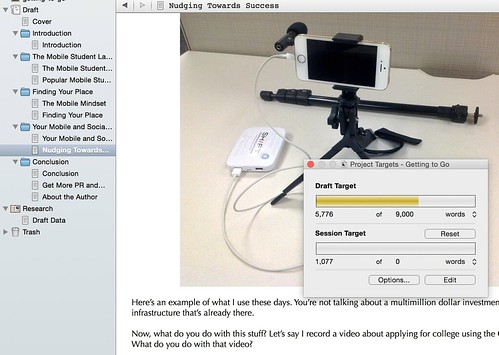I’m often asked how I prepare presentations and talks for public speaking. The answer has changed a lot over the past year, but my current process is the one I’m most happy with. First and foremost, I have to know that I have something people want to hear about. There are some topics that are evergreen, like analytics, measurement, etc. There are some topics that are new and experimental. What constitutes a good public speaking topic? The litmus test I use is whether I’d attend the talk or not, based on the title of the talk. If I wouldn’t go, I certainly won’t present it.
Once a topic is decided upon, I start to build out the talk. The process I use is one taught to me by Tamsen Webster and Oratium, which is a course I’d highly recommend anyone who does any kind of speaking partake of. I figure out what the core call to action of the talk is, the big insights that people need to believe in order to take action, and what knowledge they have to have in order to reinforce or build their beliefs. There’s a great deal more to the process than that, but you’ll have to go take the course to get it. (read more about it here)
Once I’ve worked out the framework for the talk, I typically do a mind map of the insights and knowledge that I’m going to need to provide. This abbreviated mind map then gets fed into Scrivener, my eBook writing software.
Inside of Scrivener, I write out the entire talk, word for word. I know I speak at roughly 150 words per minute, and I know the talk is going to be X minutes long, so I write 150 * X words. A 30 minute talk is 4,500 words; a 45 minute talk is 6,750 words. That way I know what I’m going to say, what I’m not going to say, etc. I know how long my talk will run, on average, which means I can avoid the two awkward situations of finishing 25 minutes early or racing through the last 10 slides in 3 minutes.
Once the script is done, I’ve effectively got my speaking notes (the mind map) and the script for rehearsal. Then it’s rehearsal time. I’ll go through and remove stuff that doesn’t work, rearrange pieces as needed, etc. until I’m happy with the final product, and verify that the word count hasn’t changed substantially.
That’s not where the process ends, though. For major events, I’ll then go and set up a landing page where people can download the eBook (because that’s what the script is, when you think about it) for lead generation purposes, and depending on the event, I may even do paid advertising to promote the eBook to event attendees. I’ll usually set up pre-scheduled tweets and social media updates, too.
The entire process from beginning to end takes about a month of on and off work. After all is said and done, it’s probably an hour a day for 30 days to create a polished final product – but the result is that when I go on stage, I do so with confidence. I know what I’m supposed to do, and I know what I’m not supposed to do.
What’s your speaking process look like?
You might also enjoy:
- You Ask, I Answer: Retrieval Augmented Generation vs Fine-Tuning?
- Almost Timely News, January 14, 2024: The Future of Generative AI is Open
- Mind Readings: Most Analytics Data is Wasted
- You Ask, I Answer: AI Music Collaborations and Copyright?
- You Ask, I Answer: Legality of Works in Custom GPTs?
Want to read more like this from Christopher Penn? Get updates here:
 Take my Generative AI for Marketers course! |



Leave a Reply